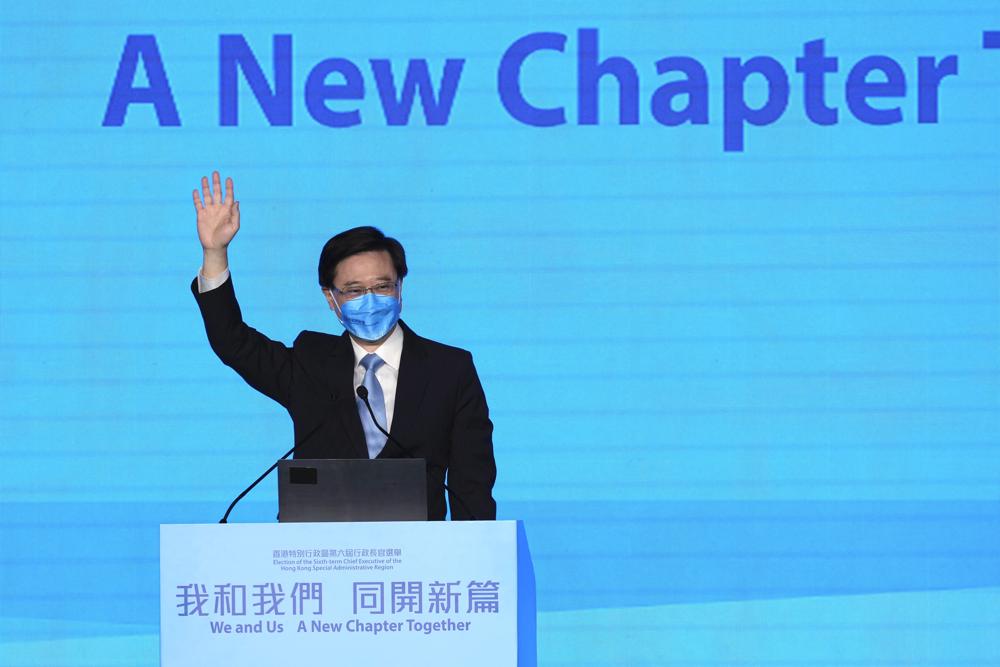

China is installing a career security official as the new leader of Hong Kong in the culmination of a sweeping political transformation that has gutted any opposition in the Asian financial center and placed it ever more firmly under Beijing’s control.
John Lee, formerly the city’s No. 2 official, is the only candidate Sunday in what is an election in name only. Well over half of the 1,500-member Election Committee that selects the chief executive has already endorsed him and he needs only a simple majority to win.
Lee will replace Carrie Lam on July 1. Her 5-year term was marked by Hong Kong’s most tumultuous period since the former British colony was returned to China in 1997.
The election follows major changes to Hong Kong’s electoral laws last year to ensure that only “patriots” loyal to Beijing can hold office. That also saw the legislature reorganized to all but eliminate opposition voices.
The elaborate arrangements surrounding the pre-determined outcome speak to Beijing’s desire for a veneer of democracy. Though they will vote in a secret ballot, Hong Kong’s electors have all been carefully vetted.
“Even autocracies today feel obligated to go through the motions of staging an election in order to project greater legitimacy to their own population and to the international community,” said Yvonne Chiu, a professor at the U.S. Naval War College who has written extensively about Hong Kong politics.
The city’s previous four chief executives were also all effectively Beijing appointees. A push to elect the leader by popular vote foundered in 2014 amid protests demanding Beijing also relinquish the right to approve candidates.
Lee’s rise grew out of massive pro-democracy protests in 2019 that spiraled into violent clashes. As security secretary, he led the campaign to confront protesters with tear gas and rubber bullets, then rounded many of them up for arrest later.
Lam implemented Beijing’s orders and was widely seen as the face of the crackdown. But the career bureaucrat still seemed out of step with China’s hardline president and Communist Party leader Xi Jinping.
For her successor, Beijing opted for Lee, a former top police official and staunch advocate of the new National Security Law that outlaws subversion, secession, terrorism and collusion with foreign forces. More than 150 activists and others have been arrested since its implementation.
Following passage of the law in 2020, the United States sanctioned Lee, Lam and other Hong Kong and mainland Chinese government officials, for “undermining Hong Kong’s autonomy and restricting the freedom of expression or assembly.”
Almost all government critics have been jailed, fled abroad or been intimidated into silence. Thousands of residents have voted with their feet, with many professionals and others leaving the city of 7.4 million people.
The intensity of the 2019 protests appeared to have caught Beijing by surprise, prompting the imposition of the National Security Law the following year and the reorganization of the legislature to put pro-Beijing forces firmly in charge in 2021.
Among the unintended effects has been the further alienation of Taiwan, the self-governing island democracy China claims as its territory. Beijing’s crackdown was seen as a major factor ensuring the re-election in 2020 of pro-independence President Tsai Ing-wen.
While Lee has said he would boost Hong Kong’s competitiveness to ensure it remains “a gateway and bridge between our country and the world,” his selection leaves little question that maintaining political stability is the priority.
That could come at the expense of Hong Kong’s reputation as a safe place to do business with a clear regulatory structure and independent judiciary. Britain has removed two judges who had been appointed to Hong Kong’s top court to ensure rule of law, saying their presence was “no longer tenable” because of increasingly oppressive laws enacted by China.
China’s long-ruling Communist Party maintains that stability sets the stage for economic growth and development.
Hong Kong’s once thriving free press has taken a beating, with the pro-democracy newspaper Apple Daily shuttered and its founder, Jimmy Lai, in jail.
Public broadcaster Radio Television Hong Kong has been brought to heel, and Hong Kong plummeted 80 places in the Reporters Without Borders 2022 World Press Freedom Index. The local Foreign Correspondents Club canceled its annual Human Rights Press Awards this year over national security concerns.
Fearing political repercussions, universities have cut ties with their student organizations, while the government has severed relations with the largest teacher’s union.
People in Hong Kong still have greater freedoms than their counterparts in mainland China, but any hopes for greater democracy have been snuffed out and replaced by concern that the city is increasingly becoming like other Chinese cities, albeit one that is “a good place for everyone to pretend that it’s just business as usual with China,” Chiu said.